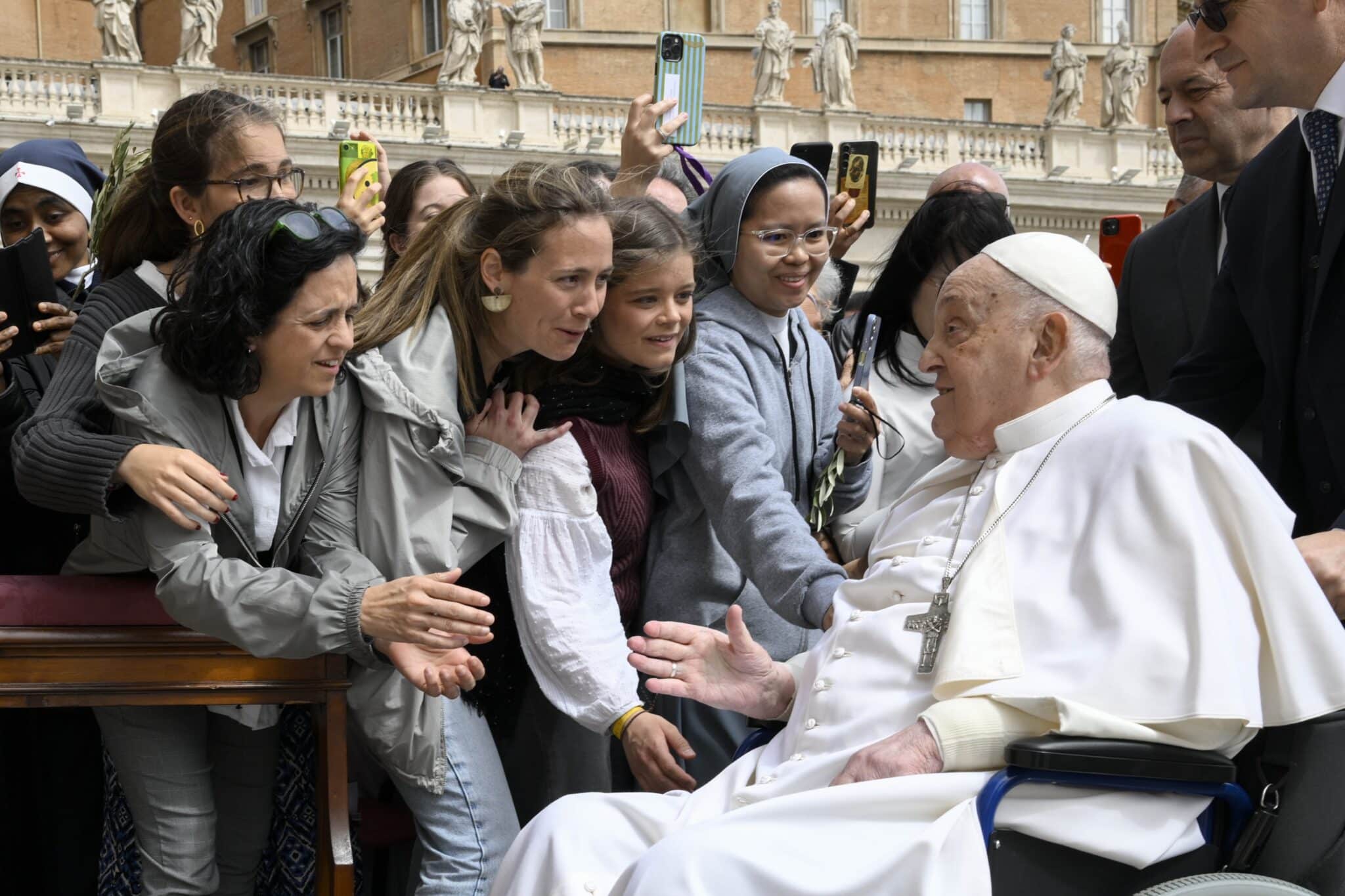The year is 1965. Sometime in October. Somewhere in New Jersey. The hallways of this house are institutionalized–an odd mixture of warmth and coldness. Baby cribs can be seen in the various rooms. Nurse attendants, religious sisters by the way they dress, can be seen in their relevant activities and assignments. One sister in particular, takes an infant from its mother’s arms and smiles. The young mother holds an air of confusion and pensive concern. With regret and sadness, she slowly removes her hospital gown with her eyes on the child. She collects her belongings, turns away and leaves the room. The smiling sister holds the child in the air, inwardly rejoicing in the preciousness and beauty of God’s newest arrival. The infant searches the room, eyes falling on the face of the smiling sister. Little did that infant know that the journey from that day forward would be a ‘a road less traveled.’
This is Kris’ story.
This is Antonia’s story.
This is Laetitia’s story.
This is a mother’s story.
This is a story of care in the midst of confusion.
This is a story of love in the midst of grief, pain, and loss.
This is my story, in so much as I have the privilege of uncovering and narrating a mystery–the mystery of the intricately woven past of a friend–a beautiful man of 53 years and director of the adult education department at Catholic Charities in Albuquerque, New Mexico.
Kris Degenhardt, a multiracial presence in the work of reaching out to the poor and marginalized of our society in an educational environment that values the dignity of every human and every creature, identifies with known ancestry of Black African, Cuban and German. And identity is at the heart of our story.
As a volunteer candidate, at the Catholic Charities facility on Bridge Street in Albuquerque, I met Kris last November of 2018 for the first time while receiving a tour of the building and its various departments. Kris was overwhelming in his support of the idea that I could be of service in his department of Adult Education, and the Volunteer Coordinator concurred. It was not long before a friendship developed between Kris and me. We were of the same age and possessed similar formative elements which contributed toward a shared, common mutuality of attitudes and perspectives.
On one occasion, Kris privately revealed some photos from his past. They were not numerous. They seemed old, in fact: Kodak Kodachrome. They were faded with time and appeared typical, in that they captured people, one or two per photograph, in various poses relevant to the context. One of these caught my eye and attention more than the rest. I asked, “Kris, is this you in the photo?” I continued, “Kris, who is the sister holding the baby? What is her name, and to what congregation of sisters did she belong?” Kris responded that the infant in the old, faded picture was indeed him, but that the religious sister nor her congregation was known.
St. Francis, her patron, was reaching up to Christ holding his arms out in prayer before the crucified.
I asked Kris if I could take a picture of the smiling sister holding him. Unreservedly, he responded in the affirmative and thought nothing more of it. He had informed me, as the conversation unfolded that day, that Catholic Charities from Trenton, New Jersey, had been the legal instrument through which he was given to adoption and granted foster parents, that St. Francis Hospital of Trenton, New Jersey was the medical facility in which he was born, that some Missionary Sisters were associated with Catholic Charities in Trenton who provided the leg work for the adoption agency, and finally, that Yardville was the name of a town in which the home for unwed mothers was located at one point in time.
It was my self-appointed mission to see if I could, through the assistance of Google and other means, locate more pieces to this puzzle of his early childhood. I was most curious about this group of sisters that sponsored a home for unwed mothers and newborn babies. I was also curious about the one sister pictured in the Kodachrome photograph. I would not share my intrigue with Kris, as I did not want to disappoint him were it the case that I could find no additional information. So, I kept it to myself.
Later that evening and on into the following morning, I was amazed at what I was able to locate about this obscure mystery – the circumstances of Kris’ early childhood, unfolding since 1965 in the forested countryside of New Jersey, outside the limits of the City of Trenton. After many searches, false leads, and unhelpful old newspaper articles, a story about the consideration of the demolition of an old convent in Yardville, New Jersey, that once was used as an orphanage and housing for unwed mothers showed up on my screen. I was on the right track. This house in the article was a multileveled, yellow, Victorian style wood structure that stood alone on top of a hill in a once forested area near Trenton, NJ. Picture after picture in this article seemed to confirm that this indeed was the home that sheltered Kris and his mother along with the sisters that cared for him. Scrolling down the page revealed a picture of an old sign that stood in front, marking the building as having belonged to a Catholic Order of Franciscan Sisters.
A search of the Congregation of Sisters depicted on the sign from the abandoned convent led to an article by Sr. Antonia Cooper OSF. It was like winning the lottery. The periodical, from the Diocese of Metuchen, The Catholic Spirit, dated October 22, 2015, told the entire backstory of the Congregation’s founding in Germany in 1855, their coming to the United States in 1929 and how their founder’s burning desire to “minister to women in need” culminated in the foundation of St. Elizabeth’s Home for Unwed Mothers in Yardville, New Jersey, among other ministries in the Northeast.
“Of course cooking and laundry was far from the founding charism to women and girls in need. In the United States, this ministry took shape with single moms, mostly in their teens, to ”protect their reputation’ in the years from 1934 to 1976. St. Elizabeth’s Home, Yardville, served more than 4,000 girls and 5,000 infants. In the years that followed, this ministry came to an end with societal changes. During the 18 years which followed, the community then provided housing for 35 women who were being reintroduced into society from large institutions for the mentally handicapped, such as Totowa, as well as from private homes.
As Franciscan Servants we live in the Truth and Simplicity of Christ, Attentive to the Dignity of the Human Person and the Reconciliation of all people.
We continue to live out our Franciscan way of life as outlined in our identity statement of our 2014 Regional Chapter: As Franciscan Servants we live in the Truth and Simplicity of Christ, Attentive to the Dignity of the Human Person and the Reconciliation of all people.
Sister Antonia serves as Regional Minister and General Leadership Councilor”
So now, it was certainly known that the name of the shelter was St. Elizabeth’s Home in Yardville, New Jersey, that the photos in the previous article were indeed those of St. Elizabeth’s, now empty, and finally, that the name of the Congregation of the Sisters represented in the Kodachrome photo was The Franciscan Servants of the Holy Child Jesus, whose founder was Antonia Werr from Kloster Oberzell, Wurzburg, Germany.
The narrative of events, put together thus far, went something like this. Kris’ mother was led to St. Elizabeth’s Home for Unwed Mothers in the spring of 1965. She stayed with a group of sisters in this house until the time of her giving birth, at which time she was taken to the nearby hospital, St. Francis, in Trenton, New Jersey. She was registered anonymously. After the arrival of Kris, she returned to her parents, and Kris was placed in the care of the same sisters that sheltered his mother. There at St. Elizabeth’s Kris remained until Catholic Charities of Trenton, with the assistance of Missionary Sisters, was able to find a foster home.
Kris had reconnected with his birth mother around 1990 through a sequence of very fortuitous circumstances. It was she who had told Kris about St. Elizabeth’s and the circumstances surrounding his birth. It made sense that his mother, the daughter of German immigrants, would be led to a home of Sisters whose foundation originated in Germany. However, could even more fortuitous circumstances lead to the name of the sister in the photo? Was there any way to connect with Sister Antonia Cooper OSF, the author of the 2015 article about her Congregation?
An online directory of the Diocese of Metuchen held the information needed to make contact possible with Sister Antonia. However, this was a photo from 53 years ago. Did the Sister depicted in the old photograph only exist in the memory of the Franciscan Sisters’ archives–inaccessible and irretrievable?
Luck or grace? Sister Antonia returned a message left on her phone and promised to look at the photograph. At this point, it seemed reasonable to include Kris into the information that had thus far been retrieved. Kris was astonished as were his two friends who happened to be with him when the news was shared. With Kris’ permission, a digital copy of the photograph was sent to Sister Antonia via email. Replying on the very same day, this was her response:
Sr. Laetitia Wickel, who studied in her native Germany, choosing to specialize as a baby nurse. She learned about the Community through two of our sisters who ministered in NYC at the ‘KDM’ – a place for Catholic German working women. She entered the Community in 1957 at Villa Maria, North Plainfield, NJ. After professing Temporary Vows, October 4, 1959, she was stationed at St. Elizabeth’s Home, Yardville, New Jersey, as a baby nurse. Missionary Servants of the Most Blessed Trinity out of Philadelphia worked at the Diocese of Trenton, Catholic Charities, who placed the teens, found tutors so they could keep up their school work, and also set up adoptions. Our mission was to provide a loving environment for the mothers and care for the infants until they were adopted.
Later after abortion was legalized, this ministry no longer needed, the home then transitioned to serve women with developmental disabilities in the mid 1970s. Sr. Laetitia then assisted these adults, who were mostly institutionalized all their lives.
Sr. Laetitia was born August 25, 1912, and died December 2, 2001, at 89 years old. She was a very sweet, soft-spoken woman with a very warm heart who loved life, and was always ready for a party! Her name means Rejoice.
Other Sisters who worked in the Nursery of St. Elizabeth’s are:
Sr. Regis Bauer +1981
Sr. Praxedis Doernchen +2000
Sr. Walgunde Dorsch – 85, returned to retire near her family in Germany, currently living at St. Francis Convent.
St. Hortensia Schug +2004 was the driver who took the teens to appointments and drove to St. Francis [Hospital in Trenton] when they were about to deliver.
Wow. Needless to say, Kris was deeply moved by the stories of the lives that supported him and his birth mother those days of 1965 in Yardville, New Jersey. He expressed his appreciation to me for uncovering the name of the smiling sister, Sister Laetitia, holding him with such tenderness and care in the early days of his life. He also was grateful to know a fuller version of the facts and stories surrounding the Congregation of Franciscan Sisters who sheltered him, Sister Laetitia who once nurtured him, and Sister Antonia’s role today in continuing to lead her Sisters, here in the United States, toward a richer fulfillment of their founder’s vision.
Sr. Laetitia nods to the photographer in the room. The photos of the previous moments would be forwarded to the mother at her new location, with the anonymity of the mother preserved in careful composition. As the photographer leaves the room to prepare for the final round of photos for that day, Sr. Laetitia once again smiles at Kris. Comfortable in the arms of the sister, Kris returns the smile. Sr. Laetitia gently places Kris into the white crib, noting the yellow glow in the room from the afternoon sun streaming in through the window. It was Saturday. She reaches up to the vase of flowers in front of the plaster Crucifix mounted on the side of the wall.
St. Francis, her patron, was reaching up to Christ holding his arms out in prayer before the crucified. She muttered her own prayer while rearranging the flowers picked and cut by herself just hours before while begging for strength to meet the hours of the evening before her. Tomorrow was Sunday, but that did not necessarily mean rest. The needs before her extracted from her soul a charity and joy that seemed greater than the tiredness she knew she would bring to Mass the next morning. Before withdrawing from the room, Sr. Laetitia stood still in the quietness of the moment gazing at the Crucifix and then glancing back at Kris, giving thanks for all that was, is and will be–marking the beginning of her new week of prayer and service.
This is Kris’ story.
This is Antonia’s story.
This is Laetitia’s story.
This is a mother’s story.
This is my story. This is your story. This is a story of care in the midst of confusion. This is a story of love in the midst of grief, pain, and loss.









5 thoughts on “Catholic Charities, Franciscan Sisters, and the ‘Yardville Babies’”
This is a wonderful article. I have been searching for a sibling that my mom gave birth to in NJ at the age of 15 and was adopted. I only have the names of my mom and father of the baby. I have just sent documents to state of NJ to see if they have the original birth certificate. I did not know about this until 6 years ago. My mother never told anyone except for immediate family. All I knew that the father of the baby who was 42, took her to NJ and left her there to have the baby. You have given me a great gift. Thank you Linda Begley. It could be she might if been one of those girls.
Thanks for the article. I’m from Germany and Sr. Hortensia Schug was the aunt of my grandmother. Visited her grave in South Plainfield NJ today.
I remember her and the other sisters. They were wonderful to us.
Way back in 1969 when I was in college, I met an incoming freshman girl and we struck up a relationship. She told me that she just found out she was pregnant from her high school boyfriend, and we stuck together anyway. I went all thru her pregnancy with her, and used to drive down to Yardville to see her, up to when she delivered her baby girl. A few months later, after Woodstock and the Moon Landing, we parted ways, and I always wondered in the back of my mind whatever became of that child. Then, a few years ago I googled up the name of the mother, (S.H.), and found out she had passed on a few years before that. Now, I am still wondering what has become of that baby girl, who would be in her 50’s now.
St. Elisabeth’s Home for Unwed Mothers — I lived their from September 1964 to February 1965 when I gave birth to a baby boy. It was a wonderful place, though I may not have thought so at the time because I was homesick. I recall my stay vividly and would be happy to share. The home we girls stayed in was not the convent (which was across the drive way) but a brick two storied facility. We had duties to perform to keep us busy and there was mass in the chapel every day. The food was wonderful and in a lovely room. There was a rather large nursery in the building which was separated from the girls. I was fortunate enough to be allowed to work in it. I sterilized the bottles, changed diapers and feed the babies. There were quite a few children and a special room with two or three children with down’s syndrome or other maladies that were hard to handle. The babies were the babies of the girls and were brought there from St. Francis hospital were we gave birth. The babies stayed until adopted or given in foster care. The nuns were German and absolutely wonderful! I remember being able to go out for walks around the area. I was a very lucky woman and my son was adopted to a wonderful family.